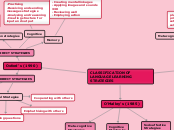door nur atika daud 9 jaren geleden
267
CLASSIFICATION OF LANGUAGE LEARNING STRATEGIES

door nur atika daud 9 jaren geleden
267

Meer zoals dit
planning prioritising setting goals self-management
Clarification / Verification Guessing / Inductive Inferencing Deductive Reasoning Practice Memorization Monitoring
-Guessing intelligently -Overcoming limitations in speaking and writing
-Practising -Receiving and sending messages strategies -Analysing and reasoning -Creating structure for input and output
-Creating mental linkages -Applying images and sounds 330 -Reviewing well -Employing action
Cooperating with others
Emphathising with others
Asking questions
Taking your emotional temperature
Lowering your anxiety
Encouraging yourself
Evaluating your learning
Arranging and planning your learning
A. Centering your learning